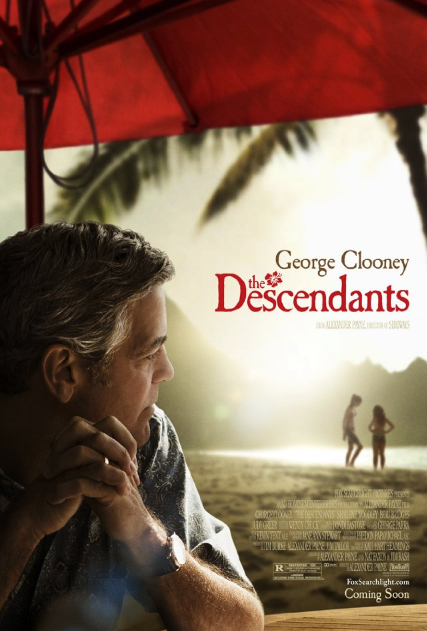By Michael Scoular (The Cascade) – Email
Print Edition: December 7, 2011
 Some have called Alexander Payne’s films profound and moving in the way they dig at human superficiality and others have called them condescending and contemptuous. That The Descendants introduces us to George Clooney’s character Matthew King with an inner monologue by him condemning outsiders who don’t know Hawaii (the movie’s setting) and don’t understand anything about its people (including himself), while he maintains his composed exterior, might suggest it falls into one of those two groups along with Payne’s other works. But it’s not that simple.
Some have called Alexander Payne’s films profound and moving in the way they dig at human superficiality and others have called them condescending and contemptuous. That The Descendants introduces us to George Clooney’s character Matthew King with an inner monologue by him condemning outsiders who don’t know Hawaii (the movie’s setting) and don’t understand anything about its people (including himself), while he maintains his composed exterior, might suggest it falls into one of those two groups along with Payne’s other works. But it’s not that simple.
Part of the criticism of Payne’s previous characterizations is how they were often perfect amalgamations of everything facile and detestable in other people. No need to criticize or grandstand when the stupidity of characters comes through in every contrived line. With The Descendants, Payne adopts a different stance. Words still fail, connection is still near impossible, and some people act in ways that might be called dumb, but this is not the defining takeaway from the people in King’s family and life. The very act of summarizing characters is what Payne has been able to avoid, so to do it here would work against what he has done in The Descendants, but consider one short, mostly insignificant scene where King along with daughters Alex and Scottie (played by Shailene Woodley and Amara Miller) arrive in an airport. They happen to meet a cousin of theirs. He offers them a ride from there, and they accept. Cousin Ralph doesn’t show up again to speak any lines of length later in the movie, but in this scene he and Matt discuss everything: from the struggles the Kings are going through, to the pressure of the family business deal, to the kids. They do so quickly, switching topics freely (without announcing them as plot points like a lesser movie would), yet conveying a connection and depth of character that is simple. They talk and act like people that know each other, and the fact their discussion isn’t of great thoughts or free from figures of speech or other clichéd sayings is not important or derided for being so.
In life, people constantly bring up subjects they shouldn’t, “make conversation” to say nothing and twist discussions around to suit themselves. Payne has always had an ear for how people do these things, but in The Descendants, he lets his characters speak and play their part in the movie in spite of their flaws, without judging them. Where Payne, in the past, has framed his characters as insignificant, pitiable objects, overlaid with mocking music, here the approach is completely different. Far from the drab, flat landscapes of small towns, Hawaii is shown in a way that refrains from being majestically idealistic as it has been in productions such as Lost, while still portraying it as a place that is alive. The climate of the place is not played up as a tourist attraction, but for once in a Payne film, the characters’ skin tones indicate that they are in fact living. And Hawaiian music, somewhere between haunting and joyful, floats in and out of scenes, possibly intruding and underlining a little boldly, but never smirking at its subjects.
As might be guessed by the title, The Descendants has the question of parenthood at its core. Movies that carry that weight often come adorned with sentiment and there are scenes that ache with emotion. But Payne doesn’t manipulate the viewer. In particular, Clooney’s character is shown to be one that can be spiteful, can lash out, and can, in his specific way, manipulate others’ emotions. But it isn’t played for laughs or tears or finger-wagging judgment. Instead, we are forced to look at something that is very close to what many people have likely experienced (a crisis of marriage, parenting, mortality, work and extended family relations). And through Payne’s observations, free of deadpan commentary, understand why it is people are so uncontrollable – why they do the inexplicable. A quick, inadvisable movement. A glance. A goodbye that might have a place in a greeting card if it weren’t for what we see it in the eyes of its speaker, and know that words can never cover what it is he wants to say.


